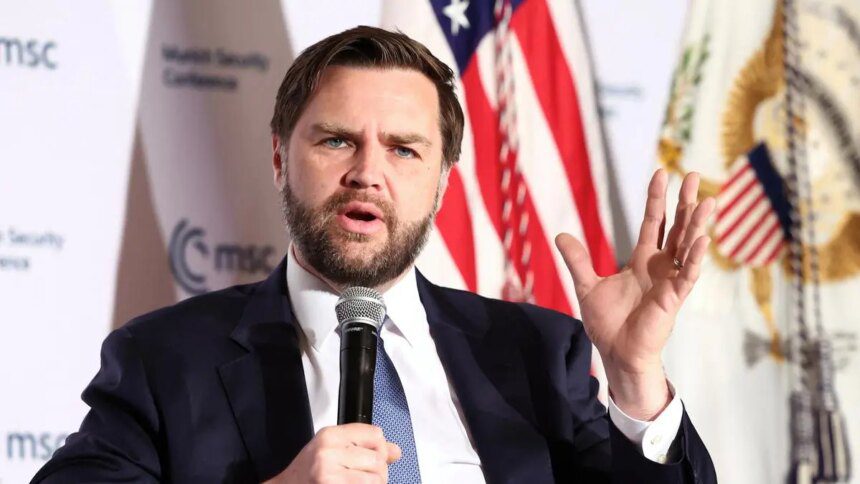US President Donald Trump’s administration expressed a possible willingness to negotiate with China to address escalating trade tensions while cautioning that recent export controls implemented by Beijing posed significant challenges to discussions.
Vice President JD Vance urged Beijing to “choose the path of reason” amid the deepening trade conflict between the two largest global economies, asserting that Trump holds considerable leverage should the dispute continue.
Trump indicated a potential diplomatic route for Chinese President Xi Jinping while subtly warning that a full-scale trade war would have adverse consequences for China. “Don’t worry about China; it will all be fine! Highly respected President Xi just had a bad moment. He doesn’t want a Depression for his country, and neither do I. The U.S. wants to help China, not hurt it!!!” he posted on Truth Social.
The comments from Trump and Vance imply that the US aims to maintain pressure on China to reverse its recent trade actions while reassuring jittery markets that an escalation isn’t a foregone conclusion. Economists at Goldman Sachs, including Jan Hatzius and Andrew Tilton, noted that recent policy shifts suggest a wider array of potential outcomes heading into crucial US-China meetings. They anticipate that both parties may scale back aggressive policies, leading to a renewed and potentially indefinite pause in tariff escalations first agreed upon in May.
Market reactions were significant, with stocks, oil, and cryptocurrencies experiencing sharp declines following a Twitter post by Trump that threatened to respond to China’s new trade measures. However, US futures saw a rebound in early Asian trading following Trump’s recent remarks.
Vance characterized the situation as a complex negotiation. “It’s going to be a delicate dance, and a lot of it will depend on how the Chinese respond,” he stated on Fox News’s Sunday Morning Futures. He emphasized that if China reacts aggressively, the US possesses substantial advantages in the ongoing negotiations, but indicated that a reasonable response from China would elicit a cooperative approach from the US as well.
In a reaction to the US stance, China’s Ministry of Commerce asserted that the US should cease threats of increasing tariffs and engage in genuine negotiations to address looming trade disputes. “Threatening with high tariffs at every turn is not the right way to get along with China,” the Ministry stated, warning that if the US continues down its current path, China would take necessary measures to protect its legitimate rights and interests.
Tensions intensified last week after China announced new export controls and trade measures, some of which do not take effect until November and may not be strictly enforced. US Trade Representative Jamieson Greer remarked on Fox News’s The Sunday Briefing, stating, “It’s become very clear that this power grab by the Chinese won’t be tolerated.”
Trump announced on Friday plans to impose a 100% tariff on certain Chinese goods and restrict US software exports, effective November 1, while also indicating that he might suspend shipments of aircraft parts. However, Trump also mentioned the importance of the November date for future negotiations, highlighting that for him, “November 1 is an eternity.”
Greer pointed to that timeframe as a potential source of stability for financial markets, suggesting that the recent volatility would subside as negotiations progressed. “That being said, these measures aren’t in place yet. They’re scheduled for November 1. So, we may see the markets calm this coming week.”
Goldman analysts warned that China’s recent actions may be aimed at securing greater concessions from the US, potentially leading to an outcome favorable to the market, such as the reduction of some US tariffs. However, they also noted the possibility of negative consequences if both nations reenact steep tariffs.
Vance, who spoke with Trump over the weekend, mentioned the president values his relationship with Xi, but stressed, “We have a lot of leverage. My hope is that we don’t have to use that leverage.” He added that the relationship would be compromised if China restricts global access to its products.
Greer referenced comments from the Chinese Commerce Ministry, which indicated that export controls are distinct from outright export bans, suggesting an awareness on the Chinese side of potential overreach.
The trade conflict escalated earlier this year, with tariffs imposed on both sides reaching levels of at least 125% before an agreement allowed for a reduction to current rates—10% on US goods by China and a cumulative 30% levy on imports from China by the US, alongside existing tariffs.
“We’re going to find out a lot in the weeks to come about whether China wants to start a trade war with us, or whether they actually want to be reasonable. I hope they choose the path of reason,” Vance concluded.
More stories related to this issue can be found on Bloomberg.com.
©2025 Bloomberg L.P.
Published on October 13, 2025.










